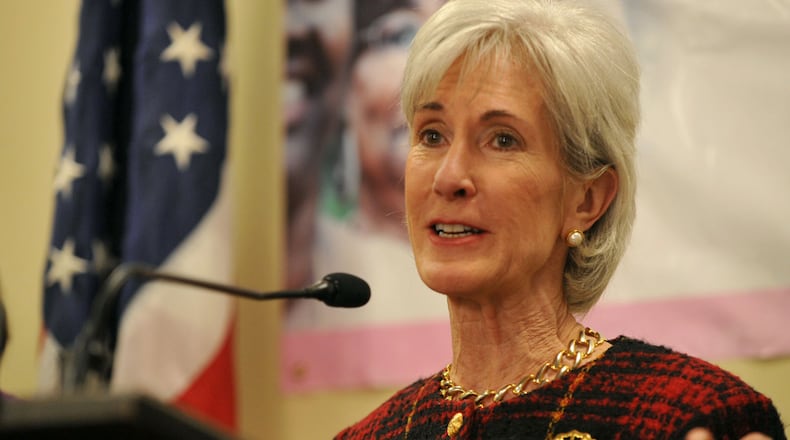With three weeks to go before the end of open enrollment for the Health Insurance Marketplace, Health and Human Services Secretary Kathleen Sebelius on Monday urged Georgians to explore their coverage options before it’s too late.
Sebelius, visiting Atlanta Monday morning, also said she hopes Gov. Nathan Deal will still consider expanding the state’s Medicaid program, another key element of the Affordable Care Act. Georgia is losing out on $9.2 million in federal funding every day because it’s not expanding, she said, pointing out that, meanwhile, hospitals and taxpayers are picking up the cost of caring for the uninsured.
“It’s not free to do nothing because people are still coming through the doors of emergency rooms,” Sebelius said during a visit to the Center for Black Women’s Wellness near downtown Atlanta. “People are still missing days on their work sites, not able to take care of their kids, living sicker and dying younger.”
State lawmakers are considering House Bill 990, which would give them, rather than Deal, the power to expand Medicaid.
Supporters of expansion say the bill would create another barrier to low-income Georgians getting the health care they need. The state, they say, can’t afford to pass up the more than $30 billion in new federal funding expansion would bring.
The federal government has promised to pay 100 percent of expansion costs for the first three years, with its share falling to no less than 90 percent thereafter. But Deal and top state Republicans have remained skeptical that the feds will hold up their end of the bargain. And, they say, Georgia can’t afford to expand a program that is already overwhelmed and inefficient.
“One hundred percent federal funding is a myth,” state Rep. Jan Jones, R-Milton, who sponsored the bill, said last week. Congress can always reduce the feds’ share, “which would be catastrophic to our budget if we expanded (Medicaid).”
Expanding Medicaid would extend health insurance to an estimated 650,000 poor Georgians, many of them adults without children. The government health program already covers 1.7 million mostly low-income children, pregnant women, the elderly and disabled.
Sebelius, while acknowledging she doesn’t know whether HB 990 will pass or fail, said she hopes the debate over whether to expand Medicaid in Georgia will continue, as it has in other states. Half of states are moving forward with expansion, six are still debating it and 19 have rejected it, according to the nonprofit Kaiser Family Foundation.
A second bill also targeting Obamacare, House Bill 707, would bar any state or local government or agency in Georgia from creating a health insurance exchange or insurance navigator program. Both bills have passed the House and are up for debate in the state Senate.
Deal opted more than a year ago to let the federal government build and operate an online health insurance exchange in Georgia. About 101,000 people have already chosen health plans through HealthCare.gov — more than 80 percent of whom qualified for federal tax credits to help lower the cost. Open enrollment closes March 31. Individuals who skip insurance coverage this year face a penalty of $95 or 1 percent of taxable income, whichever is higher. That penalty will increase substantially in future years. The next open enrollment period begins in the fall for coverage that will take effect in 2015.
“What we need to do is have people understand that in three weeks they run out of time, at least for 2014,” Sebelius said. “There’s a lot of health security and financial security on the line.”
About the Author
Keep Reading
The Latest
Featured



